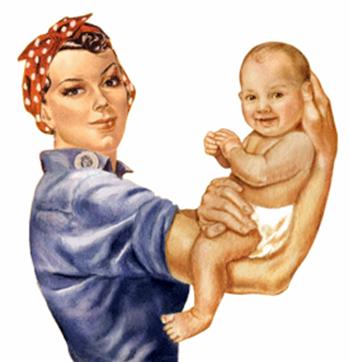by Amy Reynolds
This past Saturday, Barbara Mikulski from Maryland became the longest-serving female congressperson in the history of the United States, having been elected to the Senate in 1986. She is currently one of 17 female senators (an all-time high for the United States). Jennifer Lawless and Richard Fox suggest in Men Rule (a report released by American University) that the United States ranks 91st when it comes to the representation of women in national office.
One of the findings of Lawless and Fox is that part of the gender gap in political representation is connected to ambition. One of the seven variables affecting ambition is the lower encouragement women receive to run for office. They argue:
The 2011 gender gap in political ambition—based on a variety of measures—is roughly the same magnitude as it was in 2001. Women today remain just as unlikely, relative to men, as women ten years ago to consider running for office. . . . Because of deeply embedded patterns of gender roles and norms, becoming a candidate will remain a far less appeasing and feasible option for women than men, at least for the foreseeable future.
Such a finding seems to go hand in hand with a 2011 article from the American Journal of Sociology by David Cotter, Joan Hermsen, and Reeve Vanneman that suggests gender role attitudes have not changed much since the turn of the century. Especially interesting to me was the report that only around 70% of respondents claimed that working mothers could have warm relationships with their children.
 While gender roles are not the same as they were fifty years ago, some of the same assumptions persist. (A recent petition, Dad’s Don’t Babysit, is aimed at changing the assumptions of the Census Bureau, as evidenced in the Survey of Income and Program Participation, that moms are the designated parents). And as Christine Percheski notes in her 2008 article in the American Sociological Review, although professional women with children are staying in the workforce, the assumption is often that such women are opting out. She attributes this in part to the fact that there are increased numbers of women with advanced training, making it such that the percentage of unemployed women with advanced degrees is also rising.
While gender roles are not the same as they were fifty years ago, some of the same assumptions persist. (A recent petition, Dad’s Don’t Babysit, is aimed at changing the assumptions of the Census Bureau, as evidenced in the Survey of Income and Program Participation, that moms are the designated parents). And as Christine Percheski notes in her 2008 article in the American Sociological Review, although professional women with children are staying in the workforce, the assumption is often that such women are opting out. She attributes this in part to the fact that there are increased numbers of women with advanced training, making it such that the percentage of unemployed women with advanced degrees is also rising.
Hilary Levey Friedman, in her 2009 article in Qualitative Sociology, describes the assumptions she faced in doing fieldwork with children in competitive activities. “Which One is Yours?” reveals the assumption that she (a childless graduate student at the time) was a mother—in this case, an assumption which sometimes allowed for the opportunity to discuss her own research and work.
Lately I’ve been reflecting on the assumptions placed on me once people know already that I am a mother. The question “What does your husband do?” may be the appropriate parallel I face when I am dropping a child off at school or spending time pushing one of my daughters on a swing. This question seems more likely to emerge when I am interacting with those in evangelical (and middle or upper class) settings. As someone who teaches the sociology of gender, I must confess I am not surprised at the perceived notion that ‘good mothers’ are devoted to family in such circles. Yet I still struggle to know how to respond. I am genuinely proud of the work that my husband does, and I enjoy the opportunity to tell others about it. I am also aware that my husband is less likely than me to be talking with other parents about his spouse’s research agenda.
As I think about the power of social networking, I wonder how the assumption that a husband’s job is the most central or important in a two-parent family affects working mothers and fathers—especially those in evangelical or other Christian environments, where conservative gender norms have more resonance than in other settings. I have a hypothesis that, among those with weak ties to a family (with two working parents), more people know more about the husband’s work than the wife’s. Do you think this is the case? And if this is the case, what might be the implications? Can it be connected to findings (mentioned above) that women are encouraged less towards political positions? What about the encouragement of mothers towards other career-enhancing activities?
















